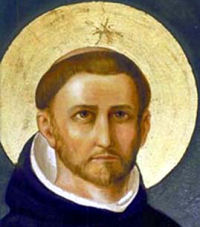Ordinary Time: August 8th
Memorial of St. Dominic, priest
Other Commemorations: St. Mary MacKillop, Religious (RM; Solemnity, Australia); Sts. Cyriac, Largus and Smaragdus, Martyrs (RM); Fourteen Holy Helpers (Hist)
» Enjoy our Liturgical Seasons series of e-books!
At the end of the twelfth century the Church in France was ravaged by the Albigensian heresy, a doctrine which was not only entirely unchristian but which, in addition, constituted a social evil. Effective measures were required to be taken to combat it. Where others had failed, a Spanish canon, Dominic Guzman, succeeded. He was notable for his learning and love of poverty. The Order of Friars Preachers, which he founded about the year 1215, was endowed by him with these two characteristics; instead of manual labor, as practiced by the Cistercian monks, he required his friars to work with their minds by preaching and teaching. He died at Bologna on August 6, 1221. His friend, Gregory IX, canonized him three years later.
According to the 1962 Missal of St. John XXIII, the Extraordinary Form of the Roman Rite, today is the feast of St. John Mary Vianney and Sts. Cyriac, Largus and Smaragdus. St. Largus and St. Smaragdus are two Roman martyrs. They were buried at first on the Ostian Way. Their bodies were later transferred, after the peace of Constantine, to a church built near the baths of Diocletian by a Christian of the name of Cyriacus. The cult of St. Cyriacus has been joined to that of the two martyrs. St. Dominic's feast in this rite is celebrated on August 4. St. John Vianney's feast in the Ordinary Form of the Roman Rite is celebrated on August 4.
The Fourteen "Auxiliary Saints" or "Holy Helpers" are a group of saints invoked because they have been efficacious in assisting in trials and sufferings. Each saint has a separate feast or memorial day, and the group was collectively venerated on August 8, until the 1969 reform of the Roman calendar, when the feast was dropped.
St. Dominic
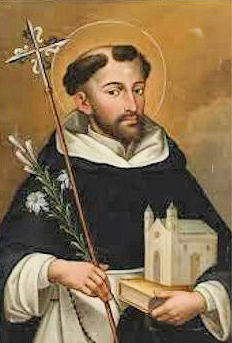 The original Martyrology gives the following: "At Bologna (upper Italy) the holy confessor Dominic, the saintly and learned founder of the Order of Preachers. He preserved his virginity inviolate and gained for himself the grace of raising three dead persons to life. By his word he crushed heresy in the bud and led many souls to piety and to religious life."
The original Martyrology gives the following: "At Bologna (upper Italy) the holy confessor Dominic, the saintly and learned founder of the Order of Preachers. He preserved his virginity inviolate and gained for himself the grace of raising three dead persons to life. By his word he crushed heresy in the bud and led many souls to piety and to religious life."
Born about 1175 in Castile (Spain), Dominic hailed from the illustrious Guzman family. First he was a canon regular at Osma; then he founded the Dominican Order, which was approved in 1216. Alongside the Franciscans, it became the most powerful Order in medieval times, giving the Church illustrious preachers — St. Vincent Ferrer, and contemplatives, Sts. Thomas of Aquinas and Pius V — and contributing immeasurably to maintaining the purity of the faith. Through the example of apostolic poverty and the preaching of the word of God the Friar Preachers were to lead men to Christ. To St. Dominic is attributed the origin and spread of the holy rosary.
The two contemporaries, Dominic and Francis, effected a tremendous spiritual rejuvenation through their own spiritual personalities and through their religious foundations. Of the two, Dominic was the realist who surpassed the other intellectually and in organizational talent. His spirit of moderation, clarity of thought, and burning zeal for souls have become the heritage of the Dominican Order. Legend has contributed the following rare anecdote as preserved in the Breviary: "During pregnancy, Dominic's mother dreamed she was carrying in her womb a little dog that held a burning torch between its teeth; and when she had given birth, it set the whole world on fire. By this dream it was made manifest beforehand how Dominic would inflame the nations to the practice of Christian virtue through the brightness of his holy example and the fiery ardor of his preaching." He died at Bologna upon hearing the liturgy's prayer for the dying: "Come, ye saints of God, hasten hither, ye angels!"
—Excerpted from The Church's Year of Grace, Pius Parsch
Patronage: Astronomers; astronomy; scientists; falsely accused people. See Catholicsaints.info for a full list.
Symbols and Representation: Lily; dog; book; star in forehead; pilgrim's staff; rosary; cross and rosary; dog holding torch; books in a fire
Highlights and Things To Do:
- Read more about St. Dominic
- Read about St. Dominic and the Rosary.
- Learn about the icon of Mary Advocata.
- Read about St. Dominic's Orange Tree and Santa Sabina.
- Because of St. Dominic's connection with oranges, think about serving different foods with oranges or citrus. Or use St. Dominic's Spanish origin and make some Spanish recipes. How about a dinner of a variety of tapas? See Catholic Cuisine for ideas.
- St. Dominic's relics are located in Basilica di San Domenico (Saint Dominic’s Basilica) in Bologna, Italy. See also the other churches where St. Dominic is honored.
St. Mary MacKillop
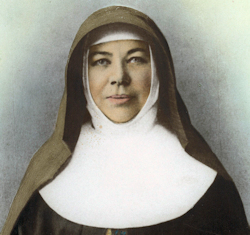 If Saint Mary MacKillop were alive today, she would be a household name. It’s not that she sought the limelight. On the contrary, she simply wanted to serve the poor wherever she found them in her native Australia. But along the way, she managed to arouse the ire of some rather powerful churchmen. One even excommunicated her for a time.
If Saint Mary MacKillop were alive today, she would be a household name. It’s not that she sought the limelight. On the contrary, she simply wanted to serve the poor wherever she found them in her native Australia. But along the way, she managed to arouse the ire of some rather powerful churchmen. One even excommunicated her for a time.
Born in Melbourne in 1842, to parents who had emigrated from Scotland, Mary grew up in a family that faced constant financial struggles. As a young woman, she was drawn to religious life but could not find an existing order of Sisters that met her needs. In 1860, she met Father Julian Woods, who became her spiritual director. Together they founded a new community of women—the Sisters of St. Joseph of the Sacred Heart, also known as the Josephite Sisters. Its members were to staff schools, especially for poor children, as well as orphanages, and do other works of charity.
As the congregation grew, so did Mary MacKillop’s problems. Her priest-friend proved unreliable in many ways and his responsibilities for the direction of the Sisters were removed. Meanwhile, Mary had the support of some local bishops as she and her Sisters went about their work. But the bishop in South Australia, aging and relying on others for advice, briefly excommunicated Mary—charging her with disobedience—and dispensed 50 of her Sisters from their vows. In truth, the bishop’s quarrel was about power and who had authority over whom. He ultimately rescinded his order of excommunication.
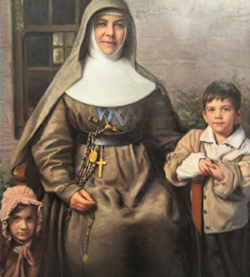 Mary insisted that her congregation should be governed by an elected mother general answerable to Rome, not to the local bishop. There also were disputes about whether or not the congregation could own property. In the end, Rome proved to be Mary’s best source of support. After a long wait official approval of the congregation—and how it was to be governed—came from Pope Leo XIII.
Mary insisted that her congregation should be governed by an elected mother general answerable to Rome, not to the local bishop. There also were disputes about whether or not the congregation could own property. In the end, Rome proved to be Mary’s best source of support. After a long wait official approval of the congregation—and how it was to be governed—came from Pope Leo XIII.
Despite her struggles with Church authorities, Mary MacKillop and her Sisters were able to offer social services that few, if any, government agencies in Australia could. They served Protestants and Catholics alike. They worked among the aborigines. They taught in schools and orphanages and served unmarried mothers.
Money, actually the lack of it, was a constant worry. But the Sisters who begged from door to door were bolstered by faith and by the conviction that their struggles were opportunities to grow closer to God.
By the time Mary was approaching the end of her life, the congregation was thriving. She died in 1909 at the age of 67. Pope John Paul II beatified her in 1995. In 2010, when Pope Benedict XVI canonized her, she became Australia’s first saint. Her liturgical feast is celebrated on August 8.
—Excerpted from Franciscan Media
Highlights and Things To Do:
- Read more about St. Mary Mackillop:
- Watch this YouTube video about the life of St. Mary Mackillop.
- Find out more about the religious order St. Mary Mackillop founded: Sisters of St. Joseph of the Sacred Heart.
Sts. Cyriac, Largus and Smaragdus
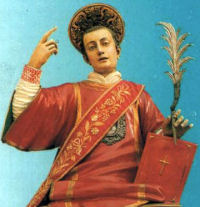 The Acts concerning these martyrs give many fictional details. Together with Sisinius, Largus and Smaragdus, Cyriac languished a long time in prison. Among the miracles that Cyriac worked was that of freeing through his prayer Arthemia, the daughter of Emperor Diocletian, from an evil spirit. Thereupon he was sent to the Persian king Sapor and performed a similar miracle in favor of his daughter Jobias. But after baptizing the king and 430 of his entourage, he returned to Rome. Upon orders from Maximian the Emperor, he was arrested, chained, and dragged to prison. Four days later he was taken from confinement, drenched with seething pitch, and tortured on the rack; in company with Smaragdus and twenty other Christians he finally was beheaded on the Via Salaria near the gardens of Sallust."
The Acts concerning these martyrs give many fictional details. Together with Sisinius, Largus and Smaragdus, Cyriac languished a long time in prison. Among the miracles that Cyriac worked was that of freeing through his prayer Arthemia, the daughter of Emperor Diocletian, from an evil spirit. Thereupon he was sent to the Persian king Sapor and performed a similar miracle in favor of his daughter Jobias. But after baptizing the king and 430 of his entourage, he returned to Rome. Upon orders from Maximian the Emperor, he was arrested, chained, and dragged to prison. Four days later he was taken from confinement, drenched with seething pitch, and tortured on the rack; in company with Smaragdus and twenty other Christians he finally was beheaded on the Via Salaria near the gardens of Sallust."
Popular piety has numbered St. Cyriac among the Fourteen Holy Helpers. The existence of a martyr with this name seems well attested by the trustworthy Depositio Martyrum of 354. The remaining details in the above account are pure fiction. But the story may bring to mind that endless series of heroic souls who suffered for Christ even more dreadful tortures than those fiction describes.
—Excerpted from The Church's Year of Grace, Pius Parsch
Symbols and Representation of St. Cyriacus: against diabolical possession; against eye disease; against temptations (especially at time of death); eyes; Altidona, Italy; Montebello sul Sangro, Italy; Saint-Cierges, Vaud, Switzerland
Highlights and Things to Do:
- Read more about these three martyrs:
The Fourteen Holy Helpers
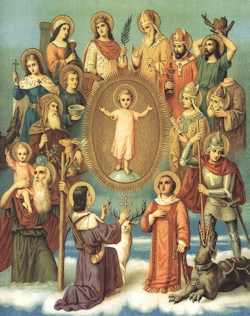 Devotion to the Fourteen "Auxiliary Saints" or Fourteen Holy Helpers began in Rhineland in the time of the Black Death.
Devotion to the Fourteen "Auxiliary Saints" or Fourteen Holy Helpers began in Rhineland in the time of the Black Death.
At the heart of the fourteen were three virgin martyrs: St. Margaret, St. Barbara and St. Catherine. The others of the fourteen began to be invoked and then they all became represented in different forms of art. And veneration of these saints began in a monastery that held their relics.
All of the saints except St. Giles were martyrs.
The Fourteen Holy Helpers are invoked as a group because of the Black Plague which devastated Europe from 1346 to 1349. Among its symptoms were the black tongue, a parched throat, violent headache, fever, and boils on the abdomen. The victims were attacked without warning, robbing them of their reason, and killed within a few hours; many died without the last Sacraments. No one was immune, and the disease wreaked havoc in villages and family circles. The epidemic appeared incurable. The pious turned to Heaven, begging the intervention of the saints, praying to be spared or cured. Each of these fourteen saints had been efficacious in interceding in some aspect for the stricken during the Black Plague. The dates are the traditional feast days; not all the saints are on the General Roman Calendar.
- St. Blaise (also Blase and Blasius) (February 3), bishop and martyr. He is invoked against diseases of the throat. Blessing of the throats takes place on his feast day.
- St. George (April 23) soldier-martyr. Invoked for protection for domestic animals and against herpetic diseases. Also patron of soldiers, England, Portugal, Germany, Aragon, Genoa and Venice.
- St. Acathius (also Acacius) (May 8), martyr. Invoked against headaches and at the time of death's agony.
- St. Erasmus (also St. Elmo) (June 2), bishop and martyr. He is invoked against diseases of the stomach and intestine, protection for domestic animals and patron of sailors.
- St. Vitus (also St. Guy) (June 15), martyr. Invoked in epilepsy, chorea ("St. Vitus' dance"), lethargy, and the bites of poisonous or mad animals and against storms. Also protection for domestic animals. Patron of dancer and actors.
- St. Margaret of Antioch (July 20), virgin and martyr. Invoked against backache. Patron for women in childbirth.
- St. Christopher (also Christophorus) (July 25), martyr. Invoked against the plague and sudden death. He is the patron of travelers, especially motorists, and is also invoked in storms.
- St. Pantaleon (July 27), bishop and martyr. Invoked against consumption, protection for domestic animals and patron of physicians and midwives.
- St. Cyriacus (also Cyriac) (August 8), deacon and martyr. Invoked against diseases of the eye and diabolical possession. Also interceded for those in temptation, especially at the time of death.
- St. Giles (also Aegidius) (September 1), hermit and abbot. Invoked against the plague, panic, epilepsy, madness, and nightmares and for a good confession. Patron of cripples, beggars, and breastfeeding mothers.
- St. Eustace (also Eustachius, Eustathius) (September 20), martyr. Invoked against fire — temporal and eternal. Patron of hunters. Patron in all kinds of difficulties, and invoked in family troubles.
- St. Denis (also Dionysius) (October 9), bishop and martyr. Invoked against diabolical possession and headaches.
- St. Catherine of Alexandria (November 25), virgin and martyr. Invoked against diseases of the tongue, protection against a sudden and unprovided death. Patroness of Christian philosophers, of maidens, preachers, wheelwrights and mechanics. She is also invoked by students, orators, and barristers as "the wise counselor."
- St. Barbara (December 4), virgin and martyr. Invoked against fever and sudden death. Patron of builders, artillerymen and miners. Also invoked against lightning, fire and sudden death.
Highlights and Things To Do:
- Each of these saints are honored individually throughout the Liturgical Year, the traditional feast honoring them as a group is no longer on the calendar or included in the Roman Martyrology. However, there are churches dedicated to the group, such as
- in Germany, the Basilica of the Fourteen Holy Helpers (German: Basilika Vierzehnheiligen) located in Bad Staffelstein in Bavaria. Translate the site to see the different statue information of the Mercy Altar.
- Franciscan Monastery of Kadaň, Czech Republic.
- Langheim Abbey in Lichtenfels, Bavaria, famous for Matthias Grünewald's "Holy Helpers" altarpiece.
- Bode Museum.
- Four Holy Marshals, Quirinus of Neuss, Hubert of Liege, Cornelius, and Anthony the Great, a subset of the 14.
- In Engelbert Humperdinck's opera, Hansel and Gretel, the "fourteen angels" of the lost children's prayer are the Fourteen Holy Helpers. The English words are familiar:
When at night I go to sleep,
Fourteen angels watch do keep,
Two my head are guarding,
Two my feet are guiding;
Two upon my right hand,
Two upon my left hand.
Two who warmly cover
Two who o'er me hover,
Two to whom 'tis given
To guide my steps to heaven. - CatholicSaints.info has more information on the Fourteen Holy Helpers.


